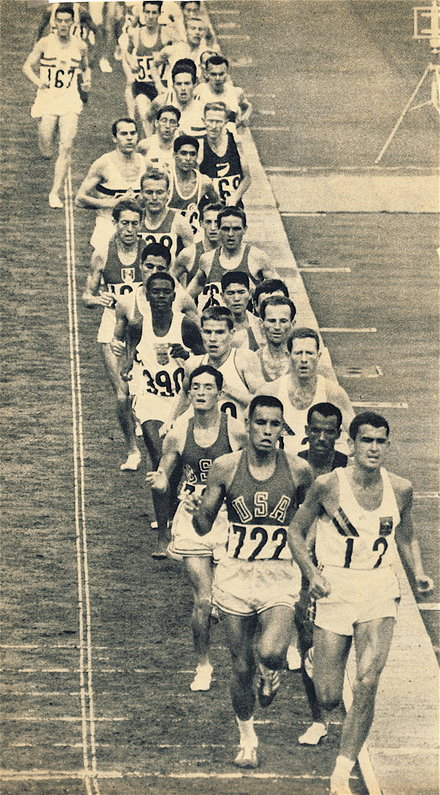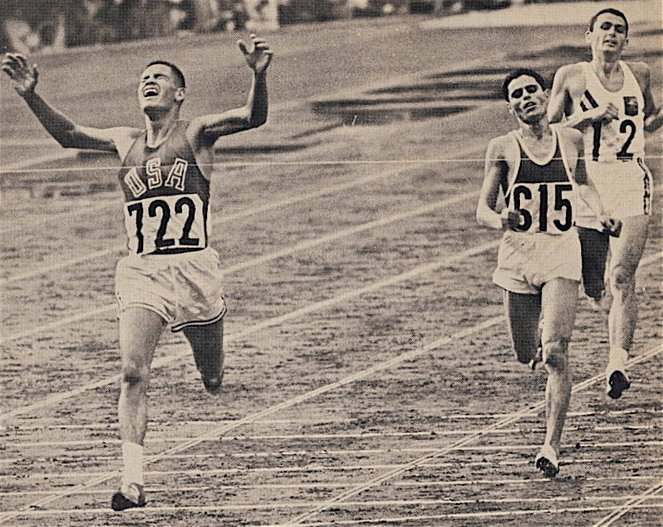Mills v Clarke v Gammoudi
Great Races #16
10,000, Tokyo Olympic Games, 1964
This race was billed by Track & Field News as “the greatest 10,00 meters of all time.” There was a large field of 38 starters. Even more had entered, and there was a strong lobby to schedule heats. As it turned out, the large field did affect the race in the last lap as the leaders had to dodge in and out of the 12 lapped runners. Clarke compared his last lap to “a dash for a train in a peak-hour crowd.” (Ron Clarke, The Unforgiving Minute, p. 19)
 |
| Clarke leads the large field. Mills (722), Wolde and Lindgren follow. A young Keino (390) is well placed. |
Almost half of the 38 starters had beaten 29:00 for 10,000 or the Six-Miles equivalent. With the WR at 28:15.6, this meant that there were a lot of runners who could be considered potential medalists. The most favored was WR-holder Ron Clarke. The previous year he had surprised the world by knocking 2.6 seconds of Bolotnikov’s WR with 28:15.6. However, he was relatively inexperienced at international level. Bolotnikov, himself, was also in the field. The current Olympic champion at this distance still commanded respect at age 34. His form, however, was questionable. Another favorite was 5,000 Olympic champion Murray Halberg (31), who had an impressive 28:33 clocking to his name. The American hopes were with 18-year-old Gerry Lindgren and Marine Billy Mills (26), who had a best time equivalent to 28:56. The Russians, also had a fine specialist in Leonid Ivanov, who had been consistently improving his times in the 28:40s.
Pyotr Bolotnikov, the Olympic champion in Rome, led the field on a wet track with a brisk 64 first lap. When he slowed, Ron Clarke took the lead and was at the head of the field for much of the first half of the race. There were no attempts to break over the first 5,000. The kilometer times and the leaders were as follows: 1,000 Mills and Gamoudi (Tunisia) 2:42.0; 2,000 5:29.6 Clarke; 3,000 Wolde (Ethiopia) 8:20.9; 4,000 Clarke 11:13; 5,000 Mills 14:04.6. This WR pace reduced the lead pack to five runners: Mills, Clarke, Wolde, Gamoudi and Tsuburaya (Japan).
After the halfway mark, the Japanese was soon dropped. And over the four the next 4K Clarke tried to assert his authority: “My improvised plan was to accelerate every other lap in the hope of separating myself…. My pursuers held on.” (The Unforgiving Minute, p. 17) At one stage Mills dropped back almost 15 meters. But Clarke could not take advantage of this. The overall pace per K was very steady: Clarke led at all the splits: 6,000 16:57.9; 7,000 19:52.6; 8,000 22:47; 9,000 25:42.8. With three laps to go, Clarke felt confident of victory. Then Wolde, nursing a calf injury, dropped off, leaving just three runners to sort out the medals.
 |
| Mills well ahead of Gammoudi and Clarke at the finish. |
Under stadium lights that had just been turned on, the trio were locked together at the bell. Clarke and Mills were running side-by-side. Almost immediately they encountered a lapped runner on the crown of the bend who did not follow the etiquette of “moving out.” (Bolotnikov, Clarke recalls, was the only one who did move out when being lapped.) It was at the moment of overtaking that the drama occurred. Mills, on the outside, was reluctant to allow Clarke to run wide past the lapped runner. They bumped and Mills staggered across three lanes to his right. This allowed Gamoudi, who was right behind, to dash between them into the lead. The film shows clearly that Gamoudi grabbed Clarke’s shoulder at this point to get ahead. Mills recovered well and followed Clarke to chase down the Tunisian. Once in the lead, Gamoudi increased his lead to 7 meters by the start of the last bend. Then Clarke made his effort and quickly closed the gap. He managed to catch Gamoudi at about 80 from the tape. Meanwhile, Mills lost ground on Clarke from the crown of the bend and seemed to be out of the race for first place.
 |
| The finish: An ecstatic Mills and two dejected followers. |
Clarke’s great effort had brought him up to Gamoudi’s side, but he never got ahead, as the Tunisian managed to respond to his challenge. Mills meanwhile seemed to get a new life and quickly closed on the other two. He closed from100-50 to go, and then exploded, roaring past Clarke and then Gamoudi for an astonishing victory. “His burst was so totally unexpected that it deflated both Mohamed and me,” Clarke recalled. (The Unforgiving Minute, p. 19) The first four beat the Olympic record; the times of the first three were impressive in view of the crowded and soft track.
Retrospect: Billy Mills ran a PB of 42 seconds and commented that he ran the race as if in a dream. He told Track and Field News: “I guess I was the only one who thought I had a chance. I figured if I stayed up there with the leaders, my speed would carry me in.” (Oct/Nov. 1964, p. 13.) Clarke following a post-race chat with Murray Halberg, admitted that as WR holder he should have taken the initiative. But he wrote later: “Billy deserved to win for his persistence, his opportunism and his sound tactical sense in finally making his bid on the outside lane, which was firmer.” Gamoudi ran brilliantly but was lucky not to have been disqualified. Halberg (7th with 29:10.8 PB) ran well considering he was suffering from a virus. Bolotnikov (25th in 3 0:52.8) ran with an injury suffered just prior to this race.
1. Billy Mills USA 28:24.4; 2. Mohamed Gamoudi TUN 28:24.8; 3. Ron Clarke AUS 28:25.8; 4. Mamo Wolde ETH 28:31.8; 5. Leonid Ivanov USSR 28:53.2; 6. Kokichi Tsuburaya JAP 28:59.4.
Leave a Comment